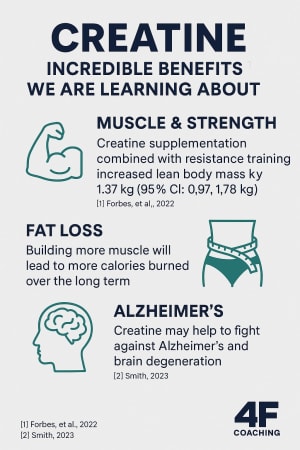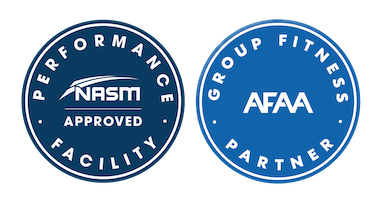
Creatine: More Than Just a Muscle Builder – A Powerful Ally for Strength, Fat Loss, and Brain Health When most people think of creatine, they imagine bodybuilders and athletes tossing back a scoop of powder to supercharge their workouts. But the truth is, creatine is so much more than just a gym supplement. It’s a naturally occurring compound in your body, found in muscle tissue and sourced from foods like red meat and fish. And now, science is revealing just how profound creatine’s impact is—not only on muscle growth and fat loss but also on long-term brain health. Creatine is a compound made from the amino acids arginine, glycine, and methionine. It is primarily stored in skeletal muscle and used during high-intensity, short-duration activities to regenerate ATP (adenosine triphosphate), the primary energy currency of cells. Although the human body produces creatine naturally in the liver, kidneys, and pancreas, and we can get some through foods like red meat and fish, most people don’t consume enough to achieve optimal levels for performance and recovery. That’s where supplementation comes in. Creatine’s benefits for muscle growth are some of the most scientifically validated in sports nutrition. In fact, a 2022 meta-analysis published in Nutrients found that creatine supplementation combined with resistance training significantly increased lean body mass and muscle strength across diverse populations, including older adults and trained athletes [1]. Here’s why this matters for fat loss: more lean muscle tissue raises your resting metabolic rate. That means you burn more calories even while sitting still. Over time, supplementing with creatine helps support muscle hypertrophy, which not only improves strength and performance but also contributes to more effective fat loss. Here’s where creatine starts to look like more than just a fitness aid—it may be a vital brain health supplement, too. Alzheimer’s disease is currently the most common neurodegenerative disease in the U.S., affecting approximately 6.5 million adults. It slowly degrades memory, cognition, and the ability to function independently. But a new study published on September 29, 2023, by Aaron N. Smith in PubMed Central, sheds new light on the neuroprotective effects of creatine. The paper, titled “Creatine as a Therapeutic Strategy for Alzheimer’s Disease” [2], highlights how creatine may: Support mitochondrial function in neurons Improve cellular energy metabolism Reduce oxidative stress Protect brain cells from the damage associated with Alzheimer’s disease This is groundbreaking. While more clinical research is needed, the preliminary evidence strongly suggests that creatine could be a low-cost, accessible tool for reducing the risk of cognitive decline as we age. Is Creatine Safe? Yes—creatine is one of the most extensively researched supplements in the world, with decades of data supporting its safety and efficacy. A 2021 review in the Journal of the International Society of Sports Nutrition concluded that creatine is not only safe for healthy individuals but also has potential benefits across the lifespan—from improving cognition in older adults to aiding recovery in younger athletes [3]. It’s not a steroid. It’s not a stimulant. It’s a naturally occurring compound your body already uses—you’re just giving it more of what it needs to perform and protect itself. At 4F Coaching, our goal is to help you live stronger, longer, and healthier. Creatine is one of the simplest and most powerful ways to make that happen. Whether you’re trying to build strength, shed fat, or take proactive steps toward brain longevity, creatine is a research-backed, coach-approved tool that we believe nearly everyone should consider. Muscle. Mind. Longevity. That’s the creatine advantage. Forbes, S.C., et al. (2022). Creatine Supplementation and Resistance Training in Older Adults: A Meta-Analysis. Nutrients. https://doi.org/10.3390/nu14071361 Smith, A.N. (2023). Creatine as a Therapeutic Strategy for Alzheimer’s Disease. PubMed Central. https://www.ncbi.nlm.nih.gov/pmc/articles/PMC10537954/ Kreider, R.B., et al. (2021). International Society of Sports Nutrition Position Stand: Safety and Efficacy of Creatine Supplementation in Exercise, Sport, and Medicine. Journal of the International Society of Sports Nutrition. https://doi.org/10.1186/s12970-020-00387-3 If you’re ready to start supplementing with creatine or want to know how to integrate it into your current training plan, just ask a coach at 4F Coaching. We’re here to help you build more than just muscle—we’re here to help you build a better life.What Is Creatine and Where Does It Come From?
Creatine, Muscle Growth, and Fat Loss
Creatine’s Emerging Role in Brain Health
4F Coaching’s Take
References

